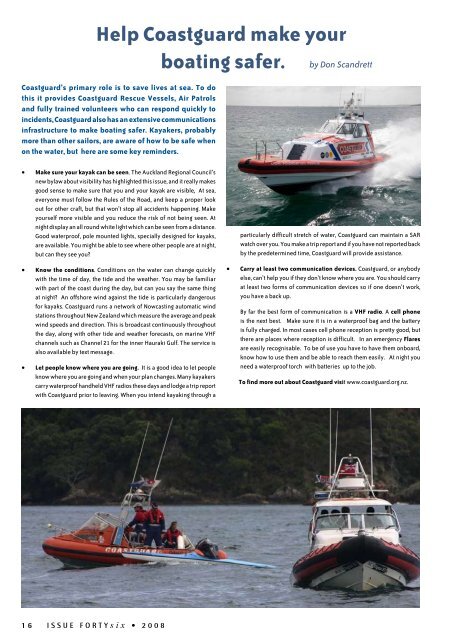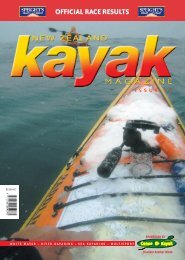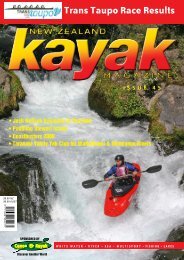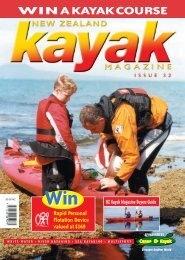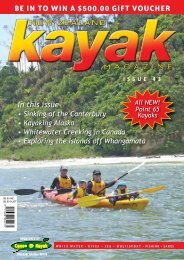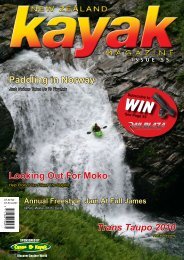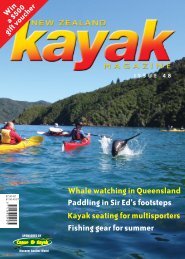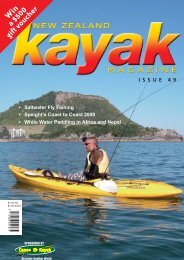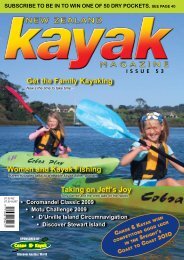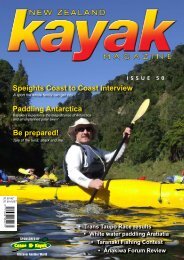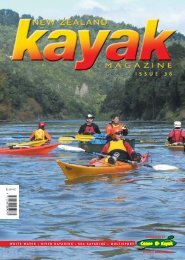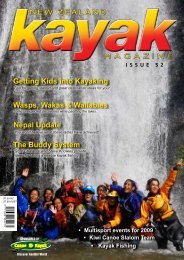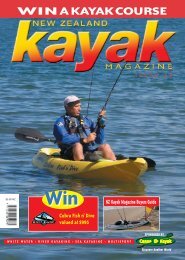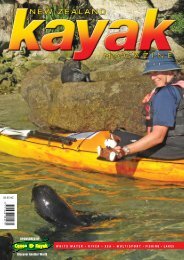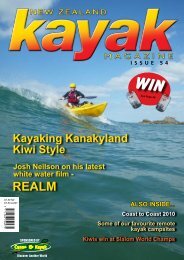kayaking the pacific islands. - Canoe & Kayak
kayaking the pacific islands. - Canoe & Kayak
kayaking the pacific islands. - Canoe & Kayak
Create successful ePaper yourself
Turn your PDF publications into a flip-book with our unique Google optimized e-Paper software.
Help Coastguard make your<br />
boating safer. by Don Scandrett<br />
Coastguard’s primary role is to save lives at sea. To do<br />
this it provides Coastguard Rescue Vessels, Air Patrols<br />
and fully trained volunteers who can respond quickly to<br />
incidents, Coastguard also has an extensive communications<br />
infrastructure to make boating safer. <strong>Kayak</strong>ers, probably<br />
more than o<strong>the</strong>r sailors, are aware of how to be safe when<br />
on <strong>the</strong> water, but here are some key reminders.<br />
• Make sure your kayak can be seen. The Auckland Regional Council’s<br />
new bylaw about visibility has highlighted this issue, and it really makes<br />
good sense to make sure that you and your kayak are visible, At sea,<br />
everyone must follow <strong>the</strong> Rules of <strong>the</strong> Road, and keep a proper look<br />
out for o<strong>the</strong>r craft, but that won’t stop all accidents happening. Make<br />
yourself more visible and you reduce <strong>the</strong> risk of not being seen. At<br />
night display an all round white light which can be seen from a distance.<br />
Good waterproof, pole mounted lights, specially designed for kayaks,<br />
are available. You might be able to see where o<strong>the</strong>r people are at night,<br />
but can <strong>the</strong>y see you<br />
• Know <strong>the</strong> conditions. Conditions on <strong>the</strong> water can change quickly<br />
with <strong>the</strong> time of day, <strong>the</strong> tide and <strong>the</strong> wea<strong>the</strong>r. You may be familiar<br />
with part of <strong>the</strong> coast during <strong>the</strong> day, but can you say <strong>the</strong> same thing<br />
at night An offshore wind against <strong>the</strong> tide is particularly dangerous<br />
for kayaks. Coastguard runs a network of Nowcasting automatic wind<br />
stations throughout New Zealand which measure <strong>the</strong> average and peak<br />
wind speeds and direction. This is broadcast continuously throughout<br />
<strong>the</strong> day, along with o<strong>the</strong>r tide and wea<strong>the</strong>r forecasts, on marine VHF<br />
channels such as Channel 21 for <strong>the</strong> inner Hauraki Gulf. The service is<br />
also available by text message.<br />
• Let people know where you are going. It is a good idea to let people<br />
know where you are going and when your plan changes. Many kayakers<br />
carry waterproof handheld VHF radios <strong>the</strong>se days and lodge a trip report<br />
with Coastguard prior to leaving. When you intend <strong>kayaking</strong> through a<br />
particularly difficult stretch of water, Coastguard can maintain a SAR<br />
watch over you. You make a trip report and if you have not reported back<br />
by <strong>the</strong> predetermined time, Coastguard will provide assistance.<br />
• Carry at least two communication devices. Coastguard, or anybody<br />
else, can’t help you if <strong>the</strong>y don’t know where you are. You should carry<br />
at least two forms of communication devices so if one doesn’t work,<br />
you have a back up.<br />
By far <strong>the</strong> best form of communication is a VHF radio. A cell phone<br />
is <strong>the</strong> next best. Make sure it is in a waterproof bag and <strong>the</strong> battery<br />
is fully charged. In most cases cell phone reception is pretty good, but<br />
<strong>the</strong>re are places where reception is difficult. In an emergency Flares<br />
are easily recognisable. To be of use you have to have <strong>the</strong>m onboard,<br />
know how to use <strong>the</strong>m and be able to reach <strong>the</strong>m easily. At night you<br />
need a waterproof torch with batteries up to <strong>the</strong> job.<br />
To find more out about Coastguard visit www.coastguard.org.nz.<br />
16 ISSUE FORTYsix • 2 0 0 8


